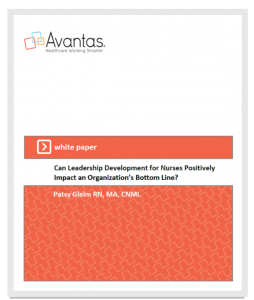by Patsy Gleim, RN, MA, CNML
In all honesty, this is a question that does not really need to be asked. The answer is instinctive and obvious. Of course, developing nurses into better leaders can impact the bottom line – but how exactly? What are the best ways of establishing leadership development initiatives in healthcare organizations?
In working with clients across the country we identified the need to build a library of research to create an evidence-based position to support their proposals to executive teams to approve such initiatives.
In my research I identified three themes: 
- Nursing leader training and development
- Leadership competencies and behaviors
- Coaching and mentoring
In Avantas’ newest white paper I dive into these three areas to provide organizations with concrete support for establishing leadership development programs. Below is the high-level overview.
Nursing Leader Training and Development
Current literature supports the premise that nursing leaders play a critical role in nursing job satisfaction, which correlates with retention and positive outcomes. The adverse effects on patient outcomes and the high cost of turnover place the impetus for healthcare organizations to hire qualified individuals into nursing leadership positions. Providing leadership development and training early in a nurse’s career can ultimately influence patient outcomes in addition to contributing to operational and fiscal stability of the organization.
Leadership Competencies and Behaviors
My research revealed that many frontline nursing leaders feel inadequately prepared for their role. A delay in formal training leaves a new nursing leader to flounder and operate in a trial and error mode. I found a considerable amount of evidence that supports the beneficial effect positive work environments have on staff satisfaction, retention, improved patient, and organizational outcomes. The establishment of a healthy work environment requires strong nursing leadership at all levels of the organization. The research suggests hiring based on clinical, cognitive, and emotional skills.
Coaching and Mentoring
The notion that nursing leaders should consider executive coaching as a way to provide one-on-one attention to members of their leadership teams was confirmed by my research. It can be used as an aid in retaining leadership talent, building leadership know-how, and developing future leaders. Professional coaching also showed benefits in helping teams work better together.
Generally, as my colleague Jenny Korth pointed out in a recent article, when a staff nurse becomes a manager or director it is the result of a combination of clinical excellence, education, and inherent leadership qualities. But, what the individual typically lacks is the knowledge and experience needed to effectively lead.
As you will discover in the white paper, evidence indeed suggests the development of nursing leadership programs can increase the bottom line as well as positively affect a number of other key areas, like quality of care. The expanded role of a nursing leader necessitates having a broad spectrum of leadership skills in addition to clinical skills.
To read the full white paper, click on the button below.
Other Avantas white paper topics include:
- Understanding the causes of Turnover
- Strategies to avoid the potential negative effects of Mergers and Acquisitions
- What Schedule Period Length is better for the bottom line and staff satisfaction
- How to reduce Incidental Worked Time, and more!
To learn more about our workforce management strategies that improve staff satisfaction and the bottom line, please email Jenny Korth at jenny.korth@avantas.com.

